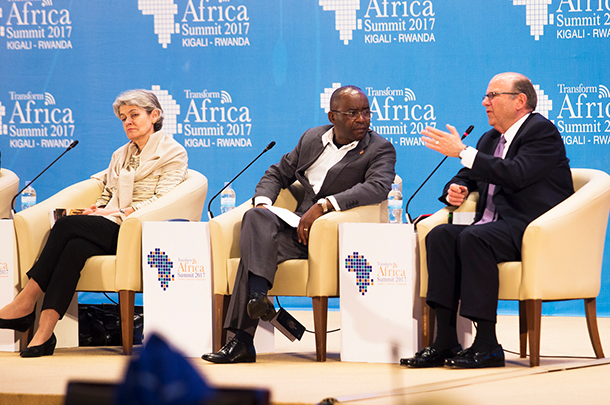Carnegie Mellon leads discussion at Transform Africa Summit
Tara Moore
May 16, 2017
On May 10th - 12, Carnegie Mellon University Africa (CMU-Africa) participated in the third Transform Africa Summit in Kigali, Rwanda. The Transform Africa Summit is the leading African forum that brings together global leaders to discuss new ways of accelerating and sustaining Africa’s digital revolution. The Summit was attended by eight heads of state and government, as well as executive leadership from the African Union, ITU, UN Women, UNESCO and IEEE.
The theme of the third edition of the Transform Africa Summit was “Smart Cities. Fast Forward.” Carnegie Mellon University (CMU) has researchers across multiple disciplines working on the topic of smart cities, which are connected, intelligent communities that utilize Internet of Things (IoT) as well as information and communication technology (ICT) to inform urban decision-makers about their cities' infrastructure, services and civic engagement.
CMU President Emeritus Jared Cohon, along with a number of CMU-Africa faculty, staff, students and alumni, attended the summit, which was hosted by H.E. Paul Kagame, President of the Republic of Rwanda.
H.E. President Kagame chaired the opening session, which featured Prof. Cohon as a conversation leader moderated by CMU-Africa’s Crystal Rugege. During this session, the Africa Smart Cities Blueprint was unveiled. It highlights key building blocks for African smart cities, outlines policy and regulatory considerations, and specifies the financing models that will fast-track the transition to sustainable smart cities. Kagame talked about the need to be intentional and strategic when investing in technology as a catalyst for growth and inclusion. “If technology is entrenching divides, rather than equalizing opportunities, then we are not harnessing it well,” Kagame said.
Higher education and collaboration with governments and the private sector is crucial to achieving a Smart Cities Agenda.
Jared L. Cohon, President Emeritus, Carnegie Mellon University
The opening session, which also had prominent thought leaders such as Strive Masiyiwa, Rupert Pearce, Phumzile Mlambo-Ngcuka, and Irina Bokova, was a high-level conversation on African smart cities and the partnerships that will foster the transition to innovation-based societies. The conversation centered on how to build future cities to successfully handle the unique and complex challenges facing African cities.
“Higher education and collaboration with governments and the private sector is crucial to achieving a Smart Cities Agenda,” said Cohon. “CMU-Africa is an example of the importance of higher education and the importance of partnership with governments.”
Currently, CMU researchers are shaping public policy innovations and partnering with government agencies to incubate a range of technological systems that will improve safety, enhance mobility, promote efficiency, and address pollution in the environment. CMU-Africa recently signed an MoU with Rwanda Revenue Authority to enhance data science capabilities in tax administration, which is a step towards the smart cities agenda of promoting efficiency and service delivery in government.
When Carnegie Mellon University partnered with the Government of Rwanda to establish Carnegie Mellon University Africa, it committed to developing advanced degree programs, an innovation incubator, advanced practical training programs, executive education programs, and a research center.

Source: Carnegie Mellon University Africa
CMU President Emeritus Jared Cohon attended the summit, which was hosted by H.E. Paul Kagame, President of the Republic of Rwanda.
Prof. Cohon reinforced the importance of such a partnership, saying, “We’ll be launching a Smart Cities research agenda here in Kigali focused on: mobile phone data to support transportation planning; distributed power generation; and the food-energy-water nexus. Higher education is crucial to achieving a smart cities agenda, and government, industry, and university partnerships are also essential. Carnegie Mellon is demonstrating that all over the world, including here in Kigali.”
With Africa having the youngest and fastest growing workforce in the world, youth were central to the discussion at the Summit. Alumna Lynn Kirabo, who was the CMU-Africa valedictorian in 2015, participated in the Youth Connect panel alongside Rwanda’s Minister of Youth and ICT and prominent businessman Ashish Thakkar. She emphasized the need for governments to invest in the youth, and create enabling environments for them to reach their full potential.
CMU-Africa students also had an opportunity to engage with dignitaries. First Ladies from Rwanda, Mali and Sao Tome and Principe visited the CMU exhibition, where students showcased projects and spoke about the impact of the Smart Africa Scholarship Fund.
In addition to being a co-lead sponsor of Transform Africa 2017, CMU-Africa was an active participant, with faculty featured as thought leaders on various panels:
- CMU-Africa Director Prof. Bruce Krogh participated in “Digital Talent in the Globalized Economy.” In this panel, he reinforced the need for a context-specific African curriculum and local professional networks.
- Prof. Michel Bezy was a panelist on “Local to Global: Unleashing African Innovation Potential,” and spoke about the need for supportive ecosystems.
- Prof. Patrick McSharry was a panelist on the “Africa Mayors’ Forum,” as well as “Big Data and IoT,” where he shared his expertise in big data, and its application across sectors.
- Prof. Aminata Garba was a panelist on “Internet of Value: IoT and Blockchain,” sharing her unique perspective as a former regulator and leading researcher in global ICT policy.
- Prof. Paulina Jaramillo moderated the “Developing Integrated Smart Water and Energy Solutions for Communities” panel.
The Transform Africa Summit is geared to enable member states to become more collaborative and open, and to have innovative smart economies with favorable business environments that leverage ICT innovations. Through Smart Africa, the countries will be able to attract large-scale investments, reward entrepreneurship, have rapid growth in exports, and transform African nations into smart societies.